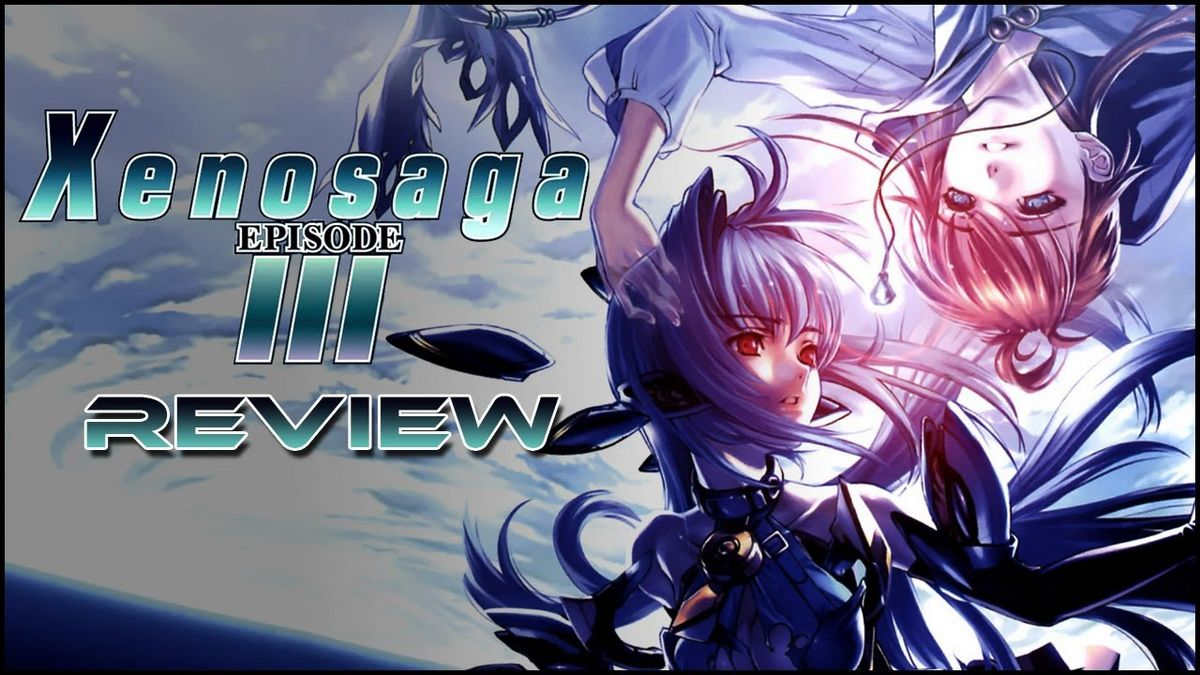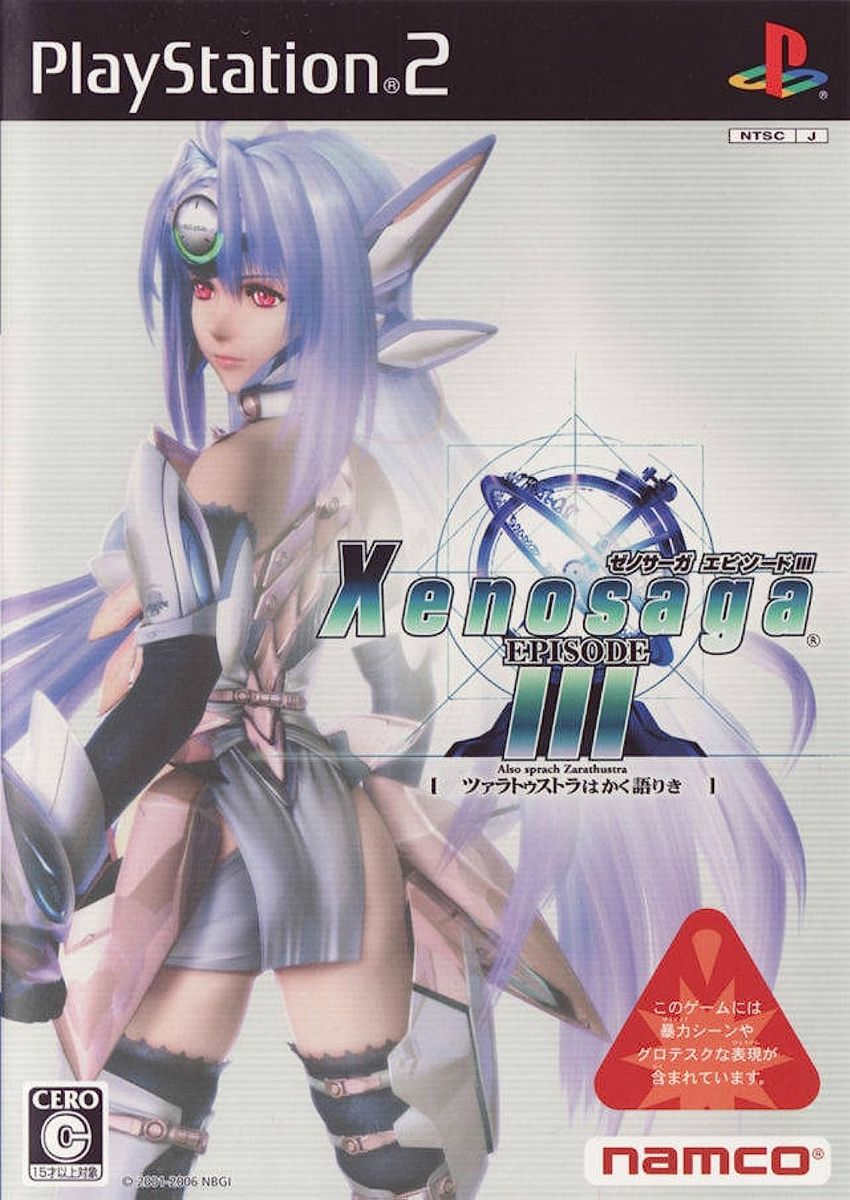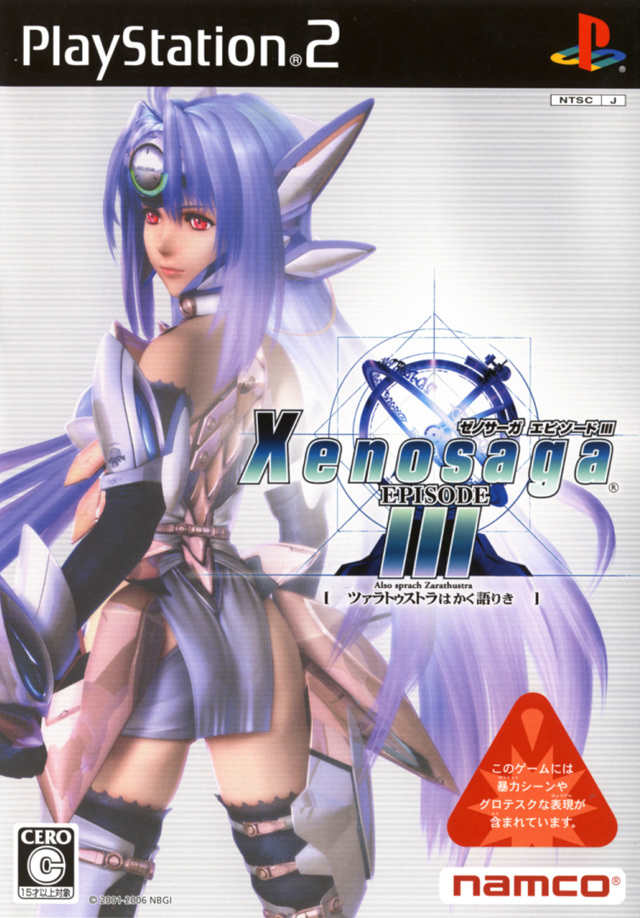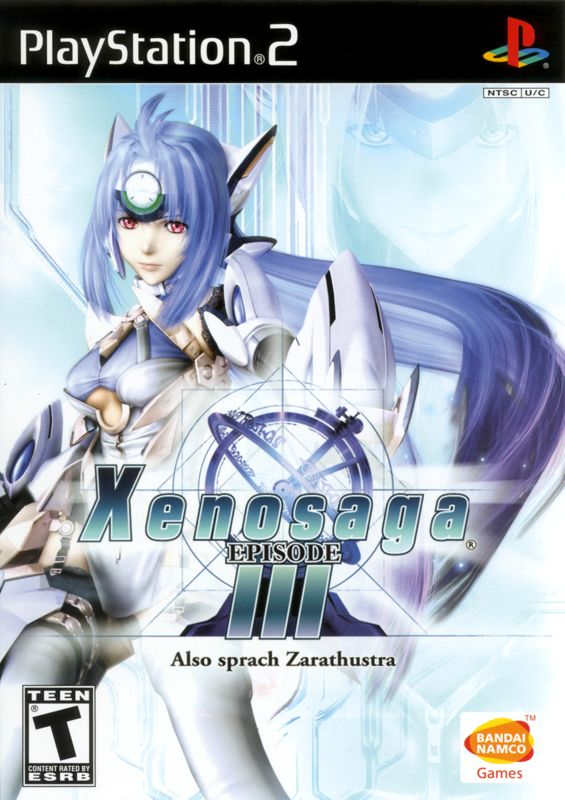Xenosaga Episode III: Also sprach Zarathustra is a cult classic video game that was released in 2006 for the PlayStation 2 console. It is the third and final installment of the Xenosaga series, developed by Monolith Soft and published by Namco Bandai Games. This science fiction role-playing game (RPG) takes place thousands of years into the future where humanity has expanded throughout space and encountered various alien species, including some with god-like abilities.
One of the unique features of this game is its philosophical references to Friedrich Nietzsche’s work “Thus Spoke Zarathustra”. The narrative explores themes such as existentialism, nihilism, free will, and morality through complex characters who each have their own motivations and beliefs. Players can customize their party members’ skills and equipment to optimize their chances in battles against enemies ranging from robots to extraterrestrial beings.
Additionally, Xenosaga Episode III also features stunning graphics that showcase intricate character designs and elaborate environments. The music score composed by Yuki Kajiura adds an epic feel to cutscenes featuring large-scale conflicts between factions vying for dominance over humanity’s fate.
Overall, Xenosaga Episode III: Also sprach Zarathustra offers players a thought-provoking RPG experience that challenges them both intellectually and strategically. Its engaging storyline combined with innovative gameplay mechanics make it a worthy addition to any gamer’s collection.
- Xenosaga Episode III: Also sprach Zarathustra – A Review of the Gameplay and Storyline
- The Significance of Nietzsche’s Philosophy in the Game Xenosaga Episode III: Also sprach Zarathustra
- An Analysis of the Characters and their Development in Xenosaga Episode III: Also sprach Zarathustra
- The Music Score in Xenosaga Episode III: Its Role and Impact on Players’ Experiences
- How Xenosaga Episode III Stands Out Among Other JRPGs with its Unique Combat System
Xenosaga Episode III: Also sprach Zarathustra – A Review of the Gameplay and Storyline
The game picks up where its predecessor, Xenosaga Episode II, left off, with players assuming control of protagonist Shion Uzuki as she works to uncover the secrets behind the planet’s destruction. Players will navigate through a variety of environments ranging from urban cities to desolate wastelands while battling enemies using turn-based combat.

One standout aspect of gameplay in Xenosaga Episode III is the emphasis on character development and customization. As players progress through the game, they can level up their characters’ abilities and equip them with new items and weapons to increase their combat prowess. Additionally, each character has unique “Ether” abilities that can be strategically used during battles for an extra advantage.
The story itself is intricate and thought-provoking, tackling themes such as religion, morality, and humanity’s relationship with technology. It features well-developed characters who are not simply caricatures but rather have individual motivations driving them forward throughout the narrative. Overall, Xenosaga Episode III delivers an immersive experience for fans of RPGs looking for deep storytelling along with challenging battles filled with strategic options at every turn.
The Significance of Nietzsche’s Philosophy in the Game Xenosaga Episode III: Also sprach Zarathustra

Nietzsche was a German philosopher who wrote extensively on ideas such as morality, power, and the human condition. The character arc of one of the game’s main protagonists, Jr., is heavily influenced by Nietzschean concepts.
Jr.’s struggle to find meaning and purpose in life mirrors Nietzsche’s idea of the “will to power,” which suggests that all living things have an inherent drive to assert their dominance over others. This desire for power can manifest itself in various forms, including creativity or destruction. Throughout his journey, Jr. struggles with his own will to power as he battles against his inner demons and external foes.
Additionally, the game features references to other key aspects of Nietzsche’s philosophy such as nihilism and eternal recurrence. The concept of eternal recurrence posits that time is cyclical rather than linear; events repeat themselves endlessly throughout history with no escape from this cycle. This idea is reflected in many aspects of Xenosaga Episode III: Also sprach Zarathustra’s plotline.
Overall, incorporating Nietzschean philosophy into Xenosaga Episode III: Also sprach Zarathustra adds intellectual depth and philosophical exploration to what would otherwise be just another sci-fi video game adventure story. It challenges players’ understanding of their own motivations while providing them with an opportunity to grapple with complex philosophical themes through gameplay mechanics like dialogue choices or moral decision-making systems – creating a truly unique gaming experience unlike any other on offer today!
An Analysis of the Characters and their Development in Xenosaga Episode III: Also sprach Zarathustra
The main protagonist of the game is Shion Uzuki, a scientist who has been involved in several conspiracies throughout the series. Throughout this final installment, we see her continue to grapple with her sense of morality as she confronts challenges that test her beliefs.
Another important character in Xenosaga Episode III is KOS-MOS, a highly advanced android created by Vector Industries. Over the course of the series, KOS-MOS learns to develop emotions and grow beyond her programming as she fights alongside Shion and friends. In this final chapter, we see KOS-MOS come into conflict with herself when forced to choose between following orders or doing what’s right for humanity.
Finally, one cannot discuss character development without mentioning Jr., a mysterious figure who has played significant roles throughout the series. His arc comes full circle in Xenosaga Episode III as he confronts his past and attempts to make amends for his mistakes while also protecting those he cares about.
Overall, Xenosaga Episode III: Also sprach Zarathustra offers complex characters whose stories are thoughtfully crafted over three games. Each character’s journey adds depth to the overarching narrative while exploring themes such as morality and self-discovery through engaging gameplay mechanics.

The Music Score in Xenosaga Episode III: Its Role and Impact on Players’ Experiences
Composed by Yuki Kajiura, the music is heavily influenced by classical and operatic themes, which create a sense of drama and intensity that perfectly complements the game’s narrative.
One of the most noteworthy aspects of Kajiura’s score is its use of leitmotifs – recurring musical themes that are associated with specific characters or events in the game. These motifs serve to enhance emotional connections between players and characters, as well as reinforce key plot points throughout the story. For example, when one character meets their demise towards the end of the game, Kajiura incorporates a hauntingly beautiful piano melody that serves to capture both mourning and reflection.
Moreover, Kajiura’s use of complex harmonies adds another level of depth to her compositions. Her arrangements effectively combine various melodic lines into rich harmonic textures that imbue each piece with an otherworldly quality characteristic to RPG games like Xenosaga Episode III: Also sprach Zarathustra. In turn, this extra layer helps immerse players even deeper into the universe created within this game world.
In conclusion, underlining how essential it was for Xenosaga Episode III: Also sprach Zarathustra’s success were its powerful music scores; they facilitated a more immersive experience for player interaction while also making significant contributions toward advancing genre expectations on what an RPG sound-design should entail going forward. Ultimately elevating gaming soundtracks from mere background noise to indispensable tools used in enhancing player engagement levels across all stages—before during after gameplay sessions alike!
How Xenosaga Episode III Stands Out Among Other JRPGs with its Unique Combat System
Unlike most games in the genre, Xenosaga’s battles are not turn-based and instead rely on real-time strategy elements. Each character has their own set of abilities and skills, which can be combined to create devastating attacks against enemies.
One of the standout features of Xenosaga’s combat system is the Boost Gauge. This gauge fills up as characters take actions in battle, and can be used to boost their speed and power for a limited time. Mastering when to use this boost can make all the difference between victory or defeat.
Another unique aspect of Xenosaga’s combat is the ability to switch between different tactical formations. These formations offer different bonuses and drawbacks depending on their composition, adding an additional layer of strategy to each battle.

Overall, Xenosaga Episode III: Also sprach Zarathustra offers a refreshing take on traditional JRPG combat systems by incorporating real-time elements and strategic options that require careful planning from players. This sets it apart from many other games in the genre and makes it a must-play for any fans looking for something new in RPG gameplay.
In conclusion, Xenosaga Episode III: Also sprach Zarathustra is a masterpiece in the gaming industry that offers an exceptional blend of captivating storytelling and immersive gameplay. The game’s intricate plotline, well-developed characters, and stunning visuals made it an instant classic among fans of the RPG genre.
The combat system in the game is also noteworthy, featuring a turn-based battle system that requires strategic thinking and planning from players. With its extensive customization options and unique features like Breaksight, Xenosaga Episode III provides players with a diverse range of gameplay experiences.
Overall, this final installment to the Xenosaga trilogy successfully delivers on all fronts – from plot development to visual design. It is evident that Monolith Soft put in a great deal of effort into making this game as polished as possible. Fans can enjoy exploring an epic narrative filled with philosophical themes while also having fun playing through engaging battles with their favorite characters.
Xenosaga Episode III: Also sprach Zarathustra remains one of the finest games ever produced for its time; it exemplifies how video games have evolved into becoming more than just entertainment but rather works of art that deserve recognition for their outstanding achievements in storytelling and gameplay mechanics alike.
Read More:- Survive the Apocalypse in The Walking Dead Episode 2 – Starved for Help Game.
- Unravel the Mystery of Fabletown: The Wolf Among Us Episode 1 – Faith.
- The Walking Dead: Season Two Episode 2 – A House Divided Review: Unraveling the Tension Among Survivors.
- Get Lost in the Action with Half-Life 2: Episode Two – The Ultimate Gaming Experience!.
- Survive the Apocalypse in The Walking Dead: Episode 5 – No Time Left | Game Review.
- Uncover the Secrets of The Vault in Tales From The Borderlands: Episode 5 – The Traveler's Tale.
- The Wolf Among Us: Episode 3 – A Crooked Mile Takes Players on a Dark and Twisted Journey.